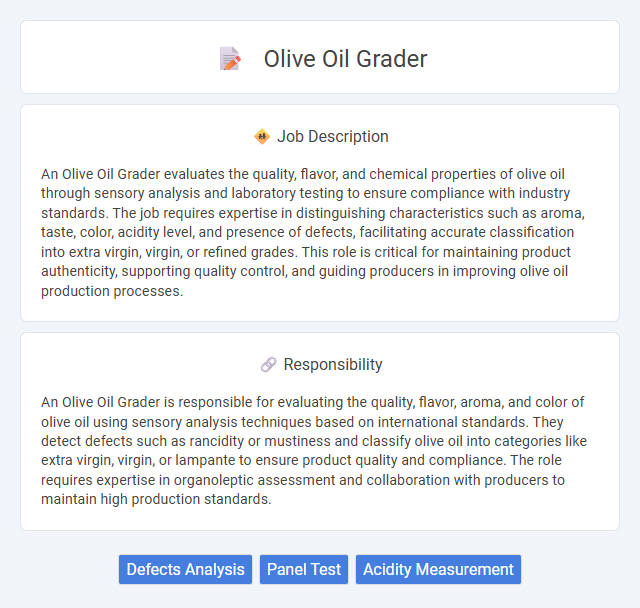
An Olive Oil Grader evaluates the quality, flavor, and chemical properties of olive oil through sensory analysis and laboratory testing to ensure compliance with industry standards. The job requires expertise in distinguishing characteristics such as aroma, taste, color, acidity level, and presence of defects, facilitating accurate classification into extra virgin, virgin, or refined grades. This role is critical for maintaining product authenticity, supporting quality control, and guiding producers in improving olive oil production processes.
Individuals with a keen sense of smell and attention to detail are likely to excel as Olive Oil Graders, given the need to detect subtle differences in aroma and flavor. Those with allergies or sensitivities to strong scents may find the job challenging and less suitable. Physical stamina for standing long hours and mental focus during repetitive tasks also play a significant role in determining one's compatibility with this position.
Qualification
Olive Oil Graders require specialized qualifications in sensory evaluation and chemical analysis of olive oil, often supported by certifications from recognized institutions such as the International Olive Council. Proficiency in identifying defects, acidity levels, and flavor profiles through blind tasting methods is essential. Experience with industry standards and quality control protocols ensures accurate grading aligned with market and regulatory requirements.
Responsibility
An Olive Oil Grader is responsible for evaluating the quality, flavor, aroma, and color of olive oil using sensory analysis techniques based on international standards. They detect defects such as rancidity or mustiness and classify olive oil into categories like extra virgin, virgin, or lampante to ensure product quality and compliance. The role requires expertise in organoleptic assessment and collaboration with producers to maintain high production standards.
Benefit
An Olive Oil Grader likely benefits from a deep understanding of oil quality, contributing to the production of premium-grade olive oil that meets strict industry standards. This role probably enhances sensory evaluation skills, allowing graders to detect subtle differences in flavor, aroma, and texture, which can increase market value and consumer satisfaction. Working as an Olive Oil Grader might also provide opportunities for career advancement within the food and agricultural sectors.
Challenge
The Olive Oil Grader job likely presents the challenge of discerning subtle differences in aroma, flavor, and color, requiring highly refined sensory skills and experience. Accuracy in grading influences product quality and market value, placing pressure on maintaining consistent standards. The role probably demands ongoing learning to adapt to evolving industry criteria and consumer preferences.
Career Advancement
Olive Oil Graders enhance their expertise by mastering sensory evaluation techniques and chemical analysis, leading to opportunities as quality control managers or production supervisors in olive oil companies. Proficiency in international grading standards and certifications such as the International Olive Council (IOC) accreditation significantly boosts career prospects. Continuous development in sensory analysis and industry regulations enables advancement into roles involving product development, regulatory compliance, and export quality assurance.
Key Terms
Defects Analysis
Olive Oil Graders specialize in defects analysis by meticulously evaluating the sensory attributes and chemical composition of olive oil to detect impurities, rancidity, and off-flavors that compromise quality. They apply standardized protocols to identify defects such as fusty, musty, or winey-vinegary notes, which result from poor harvesting or storage conditions. Accurate defect detection ensures olive oil meets regulatory standards and maintains its premium classification in the market.
Panel Test
An Olive Oil Grader specializes in conducting sensory evaluations through the Panel Test to ensure the quality and authenticity of olive oil. The Panel Test involves a trained group of tasters who assess flavor, aroma, and defects according to the standards set by the International Olive Council (IOC). Their expertise is critical for classifying olive oil as extra virgin, virgin, or lampante based on precise organoleptic criteria.
Acidity Measurement
An Olive Oil Grader specializes in evaluating olive oil quality by measuring its acidity level, a critical indicator of freshness and purity. Precise acidity measurement involves quantifying free fatty acids, with extra virgin olive oil requiring an acidity below 0.8%. Advanced titration techniques and spectrophotometric analysis are essential tools for ensuring compliance with international quality standards.
 kuljobs.com
kuljobs.com